Understanding the Concept of Haya (Modesty) in Islam
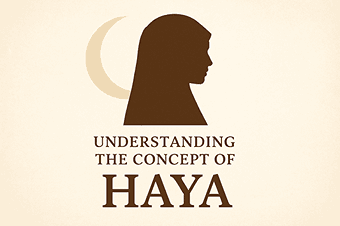
Among the many beautiful teachings of Islam, Haya (modesty) holds a special place. It is a quality that shapes a Muslim’s character, strengthens faith, and protects society from immorality. The Prophet Muhammad ﷺ described Haya as a branch of faith, highlighting its importance in every aspect of a believer’s life.
In today’s world, where boldness and shamelessness are often celebrated, revisiting the true meaning of Haya is essential. Understanding it not only helps individuals improve spiritually but also builds a healthier, more respectful community.
What is Haya?
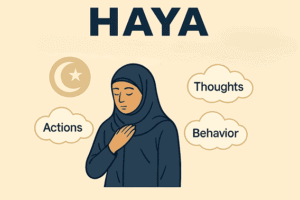
The word Haya comes from the Arabic root hayat, meaning “life.” Just as life is essential for survival, modesty is essential for the survival of faith and morality. Haya is not just about dress; it is a comprehensive concept that covers thoughts, actions, and behavior.
In Islam, Haya means feeling a sense of shame before Allah, people, and even oneself when doing something wrong. It encourages a Muslim to act with dignity, humility, and respect.
Haya as a Part of Faith
The Prophet ﷺ said:
“Every religion has its distinct characteristic, and the distinct characteristic of Islam is Haya.”
(Sunan Ibn Majah)
This shows that modesty is not optional but a central identity marker of a Muslim. When modesty is lost, faith gradually weakens, because Haya serves as a shield that prevents a believer from falling into sin.
Types of Haya
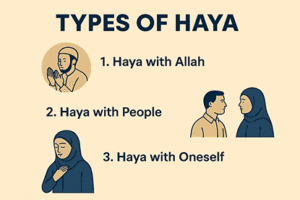
1. Haya with Allah
A Muslim should feel shame before Allah when committing sins, knowing that He sees everything. This awareness strengthens taqwa (God-consciousness).
2. Haya with People
Islam encourages respectful interaction with others. Speaking politely, avoiding indecent words, lowering the gaze, and dressing modestly are all ways to maintain Haya with people.
3. Haya with Oneself
Even when alone, a Muslim should avoid shameless acts. True Haya means having self-respect and holding oneself to higher moral standards, even in private.
Haya in Dress and Behavior
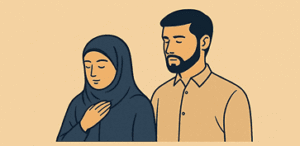
Islam places great emphasis on modest clothing for both men and women. However, modesty goes beyond covering the body. It includes avoiding arrogance in dress, controlling how we speak, and maintaining dignity in actions.
For women, the hijab is a symbol of Haya, but its purpose is to reflect inner modesty. For men, lowering the gaze and avoiding inappropriate behavior is equally essential. Both genders are commanded to protect their chastity and present themselves with dignity.
Why Haya Matters Today
In the modern era, modesty is often misunderstood as weakness or backwardness. Social media, advertising, and entertainment encourage shamelessness, making it harder for Muslims to practice Haya. Yet, it is precisely in this environment that modesty becomes even more powerful.
For individuals: Haya protects from falling into addictions, immoral relationships, and regretful choices.
For families: Haya builds trust, respect, and strong bonds between spouses and parents and children.
For society: Haya reduces corruption, harassment, and moral decline.
Practical Steps to Strengthen Haya
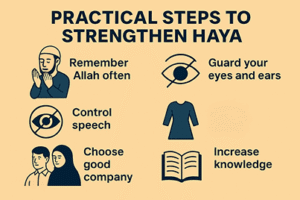
Remember Allah often – Developing awareness that Allah is always watching helps prevent sins.
Guard your eyes and ears – Avoid indecent media, conversations, and environments.
Dress with dignity – Choose clothing that reflects modesty rather than attracting unnecessary attention.
Control speech – Speak politely and avoid vulgar jokes, gossip, or hurtful words.
Choose good company – Surround yourself with people who value modesty and encourage you towards righteousness.
Increase knowledge – Studying the Qur’an and Sunnah helps strengthen the understanding of modesty as part of faith.
Conclusion
Haya is more than just outward modesty—it is an inner quality that influences every aspect of a Muslim’s life. It strengthens faith, shapes character, and protects society. The Prophet Muhammad ﷺ reminded us that when modesty is lost, everything good is lost.
In a time when immodesty is promoted at every level, holding firmly to Haya is an act of resistance, faith, and devotion to Allah. By practicing modesty in dress, speech, and actions, Muslims can live lives of dignity, protect their faith, and uphold the true beauty of Islam.
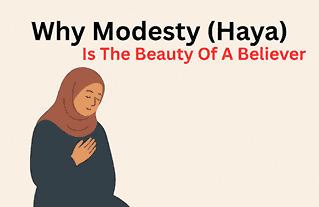

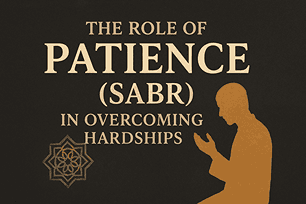










3 comments